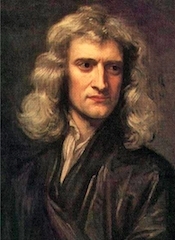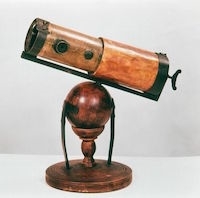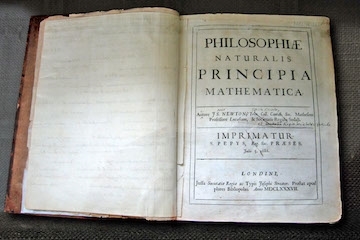 |
| (http://en.wikipedia.org/wiki/Isaac_Newton#mediavie ()) |
"I do not know what I may appear to the world, but to myself I seem to have been only like a boy playing on the seashore, and diverting myself in now and then finding a smoother pebble or a prettier shell than ordinary, whilst the great ocean of truth lay all undiscovered before me" (Newton). This very famous man was once only a curious boy, who wanted to discover more. Newton was a physicist and mathematician, that was known to be one of the greatest minds in the 17th century ("Isaac Newton Biography"). One important person in his life was his mother: "When he was three years old, his widowed mother remarried, leaving him to be reared by her mother. Eventually, his mother, by then widowed a second time, was persuaded to send him to grammar school in Grantham; then, in the summer of 1661, he was sent to Trinity College, University of Cambridge" ("Newton, Sir Isaac"). One thing Newton is known for is the "reflecting telescope that he designed and constructed in 1668-his first major public scientific achievement. This invention helped prove his theory of light and color" ("Isaac Newton Biography"). A hero, like Newton, must possess certain traits, such as being helpful, and an inspiration to others. This means that what the hero has done, changed another's life for the better, and inspired others to do the same. Newton is my hero because of his constant commitment toward his studies, his perseverance, and his relevance today.
 |
| Newton's first telescope (http://www.kidsastronomy.com/images/newtons-telesc ()) |
Isaac Newton wasn't only interested in the science that he learned, but also committed his time into studying his own ideas. He wanted to learn more than just the standard curriculum: "During his first three years at Cambridge, Newton was taught the standard curriculum but was fascinated with the more advanced science. All his spare time was spent reading from the modern philosophers." "It was during this time that Newton kept a second set of notes, entitled 'Quaestiones Quaedam Philosophicae' ('Certain Philosophical Questions'). The 'Quaestiones' reveal that Newton had discovered the new concept of nature that provided the framework for the Scientific Revolution" ("Isaac Newton Biography"). Newton was fascinated by what he learned in school. During his spare time he read the studies from the modern philosophers of his time. He even wrote down his own notes from his studies and theories. Newton studied other philosophers' notes to help him create what is now known as the "Quaestiones Quaedam Philosophicae". Newton originally wasn't planning to finish school, or become so interested in science. Before he finished school, "His mother pulled him out of school, for her plan was to make him a farmer and have him tend the farm. Newton failed miserably, as he found farming monotonous. He soon was sent back to King's School to finish his basic education. Perhaps sensing the young man's innate intellectual abilities, his uncle, a graduate of the University of Cambridge's Trinity College, persuaded Newton's mother to have him enter the university" ("Isaac Newton Biography"). Newton hated the farm work his mother gave him, and found it highly uninteresting. Luckily, his uncle was able to convince her that he should go back to school, and he ended up going to a university. Newton loved science, so during his life, he did what he could to learn as much as possible, spending all of his free time studying and writing down notes for what he believed.
Newton was a very brilliant man, who had his own ideas and theories about everything. Although, of course, some people did not agree with him or his ideas. This led to many arguments that Newton had to deal with. Newton still kept trying and had to persevere by not giving up on his studies. Other people arguing with Newton also led to many ups and downs in his life: "Ironically, the impetus that put Newton on the right direction in this study came from Robert Hooke. In a 1679 letter of general correspondence to Royal Society members for contributions, Hooke wrote to Newton and brought up the question of planetary motion, suggesting that a formula involving the inverse squares might explain the attraction between planets and the shape of their orbits" ("Isaac Newton Biography"). Although Newton had an overwhelming amount of arguments from people like Hooke, he still got back to his studies, and this rival actually helped put Newton on the right track for his studying. Newton's ideas were very brilliant, but Newton had once quit his work due to others like Hooke. Luckily, Edmund Halley helped put Newton back on track to his studies: "The paper was published in the society's Philosophical Transactions, and the reactions of English and Continental scientists, led by Robert Hooke and Christiaan Huygens, ranged from skepticism to bitter opposition to conclusions which seemed to invalidate the prevalent wave theory of light. At first Newton patiently answered objections with further explanations, but when these produced only more negative responses, he finally became irritated and vowed he would never publish again, even threatening to give up scientific investigation altogether. Several years later, and only through the tireless efforts of the astronomer Edmund Halley, Newton was persuaded to put together the results of his work on the laws of motion, which became the great Principia" ("Isaac Newton, Sir."). Newton had some discouragement in his life, but Edmund Halley helped him make not only life-changing decision for Newton, but a decision that would have affected history, and the discoveries we've made today, of getting back to work on his theories. Newton had many great ideas, and was a very brilliant person, although people like Hooke discouraged Newton. Newton didn't give up, but used their ideas to help him study more and prove them wrong.
 |
| Philosophiae Naturalis Principa Mathematica (http://upload.wikimedia.org/wikipedia/commons/4/41/NewtonsPrincipia.jpg) |
Newton had many discoveries in his time, which, although being 300 years in the past, are still very useful today! Many of Newton's discoveries are still used today, such as "Newton's first achievement [...] in mathematics. He generalized the earlier methods that were being used to draw tangents to curves (similar to differentiation) and to calculate areas under curves (similar to integration), recognized that the two procedures were inverse operations, and-joining them in what he called the fluxional method-developed in the autumn of 1666 what is now known as the calculus" ("Newton, Sir Isaac."). Newton is the creator of the very important calculus. This was a very big achievement to Newton because it was his first and now is used everyday! Newton also created many other useful tools, like his books including his notes and theories/laws: "English physicist and mathematician who invented differential and integral calculus. He used this tool in developing the concept of universal gravitation and his three laws of motion, which appeared in 1687 in Philosophiae Naturalis Principia Mathematica-considered by many the greatest work of science ever written. Newton also demonstrated that light is composed of colors and invented a reflecting telescope. He discovered the general binomial theorem in 1665, as well as working on analysis, algebra, number theory, analytic geometry, and probability" ("Newton, Sir Isaac"). Newton created a useful book, that shows all of his discoveries in it. There is also the Three Laws of Motion, which have set boundaries of the world, from what Newton figured out. Newton has created many useful tools that we have used today to help improve our knowledge of the world.
Newton was constantly committed to studying, and persevered, especially during the rivalry between Hooke and him, and finally is still relevant today. These heroic traits have made him an inspiration to me. Newton committed all of the free time he had, to learn more about the science he learned in school. After bringing his own ideas to the public, there were people like Robert Hooke, who discouraged Newton, and denied every idea he had. Newton still, even after this, was able to get back to his work, and use their ideas to help with his studies. Finally, Newton's discoveries throughout his whole life has been a great improvement to the science we have today. Newton is an inspiration to me, because of his great discoveries. "In 1687, he published his most acclaimed work, Philosophiae Naturalis Principia Mathematica (Mathematical Principles of Natural Philosophy), which has been called the single most influential book on physics. Newton died in London on March 31, 1727" ("Isaac Newton, Sir."). Newton wrote the most influential book on physics, which is all about Newton's discoveries. This was an influential book to many people who study physics, which inspires me because Newton is still influential to many people even centuries after his death. Newton also was able to keep going after other people doubted him. "At first Newton patiently answered objections with further explanations, but when these produced only more negative responses, he finally became irritated and vowed he would never publish again, even threatening to give up scientific investigation altogether. Several years later, and only through the tireless efforts of the astronomer Edmund Halley, Newton was persuaded to put together the results of his work on the laws of motion, which became the great Principia" ("Isaac Newton, Sir."). Newton kept getting negative responses, and almost completely quit his work, but was able to get back up, and keep studying. Newton even found three Laws of Motion! This inspires me because he found out something that is a law of the universe, and cannot be changed. Newton has inspired me from being one of the greatest minds in history, and being a big influence on other people who want to be just like him. Newton is a true hero because he has been a huge inspiration to others, and continues to inspire new people who look up to him. He has started from being fascinated by science, to becoming one of the people Newton would have looked up to.
Page created on 2/15/2015 12:00:00 AM
Last edited 2/15/2015 12:00:00 AM
